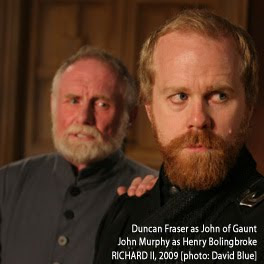Helena saves the king's life and for a reward, gets to choose a husband: Bertram. Bertram isn't into the idea, but she tricks him into having sex with her.
People who should see this show:
Everyone. It's really good.

This was an almost-perfect show. When we saw Richard II earlier, we wondered why Lois Anderson, the best part of the show, didn't have a bigger part. Now we know -- this show revolved around her, and she deserved it. Her Helena was intelligent, vivacious, determined, interesting to watch and easy to get onside with.
All's Well That Ends Well is one of Shakespeare's problem plays, marked by dark overtones even thought the heroes get married and nobody dies. It's funny, but it's an uneasy funny.
The main story element that is difficult to for the audience to accept about this play as written is that Helena is so determined to be with Bertram, a lout who clearly doesn't deserve her. Director Rachel Ditor helps to resolve this contradiction by a cunningly introduced silent pre-scene wherein Bertram, winningly played by Craig Erikson, flirts with Helena and wins her affection through the same capriciousness and irresponsibility that he later uses to victimize her. There are two or three of these scenes, expanding on what Shakespeare wrote and taking a closer look at troublesome questions in the play. Parolles, a loathsome character that we want to like anyway, benefits from another silent moment on stage: having been entrapped by his comrades, we find out just how loathsome he is -- and it is difficult to find a satisfactory answer in our minds: does he deserve this humiliation? How is he any worse than Bertram, who ends up married to our heroine? It would be more convenient to step back from this moment, but Ditor forces us to examine it closely.
The direction is brilliant: the action never seems forced, and there are subtle finishing touches that surround each scene: scene changes by frolicking butlers, background business that perfectly walks the fine line so that everyone is interesting to watch but no one detracts from the scene at hand. The design is good -- set in the Victorian period, the costumes are beautiful and appropriate for a play involving such a physical and emotional segregation of gender.
And it turns out I was wrong. Unfortunately, Haig Sutherland in a dress isn't as funny as I would have predicted, and he mars a few scenes in this show as well. Thankfully, his role is much smaller. Otherwise, each performance is top-notch.
Bonus#1: Season sponsor Starbucks was giving away gift cards the day we went-- sweet!
Bonus#2: The guy sitting in the front row opposite us who was listening to every word with an expression of ecstasy, and gesticulating as though he were conducting an orchestra, beside his perplexed-looking wife. Two shows in one!
See the show. It's great. You may even get free coffee. Plays Until September 26.
Some Highlights:
Lois Anderson's Helena: the shining star of my Bard on the Beach experience this year
Craig Erikson's Bertram: a character written to be hated, Erikson makes him likeable enough to understand why Helena is attracted to him
Gaelan Beatty's scene changes: fun
Celine Stubel's Diana: funny, innocent and intelligent at the same time
Scott Bellis' Parolles: a thoughtful interpretation of what could easily be a two-dimensional character
Duncan Fraser's King of France: another solid job, Fraser works the text masterfully



